Accueil > Elsewhere in Europe, around the world > Shale Gas Euro-News
Shale Gas Euro-News
mercredi 3 juin 2015
SHALE GAS AND OIL : AN ECONOMIC, ENVIRONMENTAL AND HEALTH ABERRATION
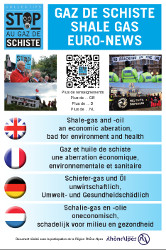
The "Collective 07 Stop Shale Gas and Oil" launches its 2017 4-languages, international document : "SHALE GAS AND OIL : AN ECONOMIC, ENVIRONMENTAL AND HEALTH ABERRATION "
As it is fundamental to realize the energy, environment and health aberration of these fuels of the past, this document is meant to inform, all along this year, as well over here as elsewhere, during the various events organized by all the collectives.
Collectif 07 Stop Gas and Oil Shale launches its document 2017.
A5, 6 pages, this document in 4 languages (FR, GB, GE, DU) can be downloaded in pdf format.
Download the document (pdf 950 ko)
The text below is the extended version of the A5-text and gives a more detailed argumentation as to why shale-exploitation should be banned.
No gazaran - Not here or elsewhere, not now or ever.
![]() Version française de l’aticle et du flyer
Version française de l’aticle et du flyer
![]() Nederlandse versie van het artikel en de flyer
Nederlandse versie van het artikel en de flyer
![]() Deutsch-Version des Artikels und Flyer
Deutsch-Version des Artikels und Flyer
SOME DETAILS ABOUT NON-CONVENTIONAL HYDROCARBONS
What makes the difference between "conventional" and "non-conventional" is not the hydrocarbons themselves -shale gas and coal bed methane (CBM) remain natural gas, in other words (mainly) methane, shale oil remains crude-, it’s where these fossil energies are located in the subsoil where they were all formed millions of years ago.
Conventional hydrocarbons migrated in porous geological layers, pushed by high pressure, and accumulated when reaching non-porous layers, called seals, to form reservoirs. The gas and oil can be extracted from these reservoirs by "simple" drilling and pumping.
The non-conventional shale hydrocarbons, gas and oil, were locked in the far less permeable shale-layer, making this layer a reservoir itself. To extract these hydrocarbons the shale has to be broken. Nowadays, the only used and known possible method to break the shale is hydraulic fracturing (fracking).
The non-conventional coal bed methane -which will not be mentioned further here- is located in deep and unexploited coal reserves, and can be extracted by means of "horizontal drilling" (the most commonly used technique at this moment), usually combined with fracking.
Learn more about coal bed methane (CBM) and coal-mine methane (CMM)
Learn more about conventional/non-conventional reserves of hydrocarbons (in french)
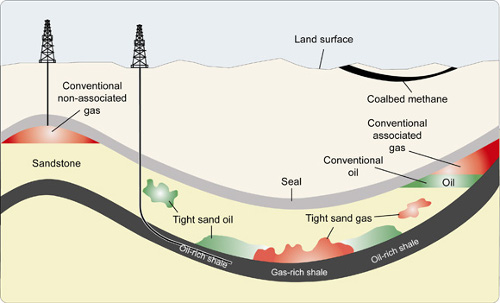
THE LURE OF RESEARCH
Often, the subject "research" is brought forward as being a necessity. But it’s impossible to evaluate correctly the potential of a reserve of shale gas or shale oil without using hydraulic fracturing on every aimed geological site, or even on every single aimed well location.
In Poland, just like in Romania, Ukraine and Lithuania, the volumes of shale gas and shale oil as estimated by the International Energy Agency (IEA) before actual drillings were made, were gigantic. Drilling showed a far lower potential.
The results of the first drillings lead to the conclusion that these modest reserves are -from an economical point of view- unfit for exploitation, which made foreign companies leave. But the wells were drilled, and the population will have to live with all the possible short, middle and long time consequences. And local companies -often state-owned- still continue production.
After the initial, exaggerated, optimism, based on overestimated assessments of the reserves, up to as high as billions of cubic meters, and on the interest shown by the big oil companies, the majors of the oil industry now estimate that exploitation of the European reserves is hardly profitable, maybe even not profitable at all.
What’s more, Europe having a higher density of population than the US regions where shale is exploited, it will be much harder to drill the number of wells necessary to make the reserves profitable.
Learn more about the current situation of shale gas in Europe
DISASTROUS CONSEQUENCES
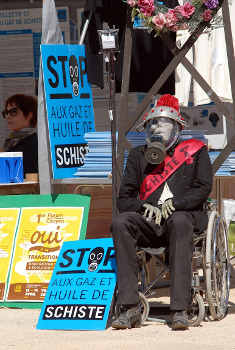
Forover fifteen years now the US has produced shale gas and shale oil by means of fracking on great depths.
Over the years different problems occurred around the production sites :
![]() health problems of residents : respiration problems, skin-diseases, cancers, neurologic diseases ;
health problems of residents : respiration problems, skin-diseases, cancers, neurologic diseases ;
![]() contamination of water and air : the storage of large amounts of frackliquids gorged with all sorts of chemicals -some of which can cause cancers- is a source of pollution, by leaking, infiltrating and evaporating ;
contamination of water and air : the storage of large amounts of frackliquids gorged with all sorts of chemicals -some of which can cause cancers- is a source of pollution, by leaking, infiltrating and evaporating ;
![]() methane leaks : methane is a strong greenhouse gas with a global-warming potential (GWP) 25 times higher than CO2 over a time-horizon of one century (this being the life span of CO2 in the atmosphere and thus used as standard measuring period). Over a 12 year period (the number of years it takes the atmosphere to absorb methane) the GWP of methane is even 86 times higher than the GWP of CO2.
methane leaks : methane is a strong greenhouse gas with a global-warming potential (GWP) 25 times higher than CO2 over a time-horizon of one century (this being the life span of CO2 in the atmosphere and thus used as standard measuring period). Over a 12 year period (the number of years it takes the atmosphere to absorb methane) the GWP of methane is even 86 times higher than the GWP of CO2.
Methane leaks during exploitation of shale hydrocarbons in a proportion of 1 to 6% of the produced amount of gas or oil, and the leaking continues after the closing down of the well, for many years (some say even up to several centuries), but the leaked amount is hard to evaluate.
According to recent studies the leaks of methane during the average lifetime of an average shale-well are far more important than initially estimated. Scientists no longer mention "just" 1 or 2%, but give as more accurate figures 0,66 up to 6,2% (different values for each single well) of the produced volume of oil or gas. The methane leaks through imperfections of the casing of drill shanks, and through breaks in the surface of the earth both old ones, and new ones caused by fracking ;
Learn more : Harmonization of initial estimates - more references
![]() micro-earthquakes : investigations done by Oklahoma scientists establishe a direct link between shale exploitation and the recent –important- increase of the number of micro-earthquakes. These earthquakes are triggered by the breaking up of the deep subsoil, by the extraction of an important volume from this subsoil, and by the re-injection of used frack-fluids.
micro-earthquakes : investigations done by Oklahoma scientists establishe a direct link between shale exploitation and the recent –important- increase of the number of micro-earthquakes. These earthquakes are triggered by the breaking up of the deep subsoil, by the extraction of an important volume from this subsoil, and by the re-injection of used frack-fluids.
![]() toxic substances : a lot is said about the great number of chemicals used for fracking, but few know that the deep subsoil itself that is fracked is, by nature, gorged with all sorts of heavy metals and radioactive elements (uranium, thorium….).
toxic substances : a lot is said about the great number of chemicals used for fracking, but few know that the deep subsoil itself that is fracked is, by nature, gorged with all sorts of heavy metals and radioactive elements (uranium, thorium….).
These toxic substances sooner or later migrate upwards following faults and breaks and reach the aquifer, or eventually even the surface of the earth. They also reach the surface when frack-fluids are being recovered. Imperfections of the casing of the shaft of the wells also let these toxics reach the atmosphere, during production, and also during as many as over 100 years after closing of the well.
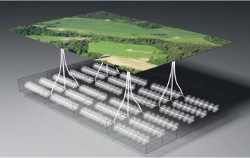
![]() A non-hydraulic technique of fracking (fracking with propane, for example) would carry the same pollution and contamination risks, as drilling and breaking up of the rock deep down could ("would" might even be a better word here…) create liaisons between the deep subsoil and the aquifer.
A non-hydraulic technique of fracking (fracking with propane, for example) would carry the same pollution and contamination risks, as drilling and breaking up of the rock deep down could ("would" might even be a better word here…) create liaisons between the deep subsoil and the aquifer.
In all cases scenarios heavy metals and radioactive elements travel upwards with the drilling mud !
At present there’s no solution to treat this mud efficaciously. Storage of it represents the same risks as storage of frack-fluids.
All these problems were minimized by the oil-companies, ignored by authorities and the rest of the country, up to the day health scandals broke out.
SOCIAL AND ECONOMICAL RAVAGES
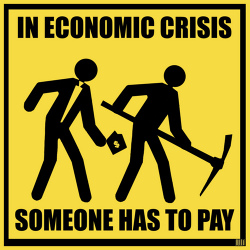
![]() The degradation of real estate, agriculture production and touristic attraction would undermine local economy and social life.
The degradation of real estate, agriculture production and touristic attraction would undermine local economy and social life.
The goal however is not asking for illusory compensation of these damages, but to refuse that whole regions are sacrificed.
These eventual compensations would be, in fact, impossible to calculate : how much to repair or compensate for the destruction of whole territories, nature, wildlife, agriculture, local economy, tourism, real estate value ?
The economic danger for investors -the speculative bubble- should be taken in consideration as well : a great numbers of companies were already forced to depreciate their assets in this domain. In the US, drilling companies have hard times to even their accounts, if these are not already frankly in the red.
In fact, a shale well (oil or gas) reaches its production peak right at the beginning. From this peak on, daily production diminishes quite rapidly. To maintain a constant (and high enough) production level of the field, new wells have to be drilled permanently.

In the US, wells can be counted by hundreds of thousands. Bear in mind that exploration or exploitation permits limit a perimeter where drilling is allowed, but don’t say anything about the number of drills that can be done within this limited area.
The enormous investments and the very short economic life-span of the wells need a quite high price of oil and gas. Recent history has shown that the course can drop rapidly -and stay low for a long time- on simple decision by the big (conventional) oil producing countries.
Learn more about the impact on American economy
AN ENERGY AND ENVIRONMENTAL ABERRATION
At a time where scientists question themselves about the "points of no return" of global warming, such as the complete melting of the ice-cover of Greenland, what to say about investors who put money -lots of it- in research for and production of fossil energies, knowing that these hydrocarbons contribute massively to the destruction of the last ice that protects us ?
The IEA itself writes in one of its last publications (World Energy Outlook 2012) that "… No more than one-third of proven reserves of fossil fuels can be consumed prior to 2050 if the world is to achieve the 2 °C goal…". To continue research and drilling to find new reserves is in contradictory to the commitments taken by leaders to act to stay under this 2° limit.
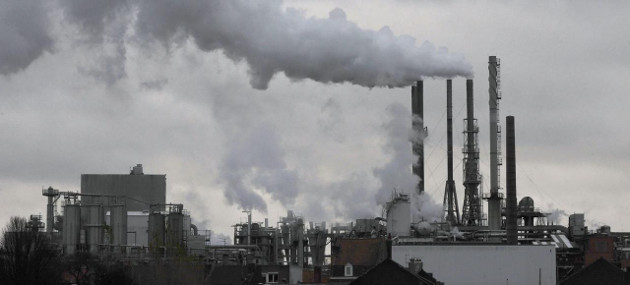
There’s an urgent choice to be made, a choice that can’t be taken away from the people. We can no longer be satisfied with the (very) short-time vision of politicians, high civil-servants, companies and investors.
![]() And if we talked about CO2, and greenhouse gases ?
And if we talked about CO2, and greenhouse gases ?
Theoretically, shale gas consumption -the use made of it by the end-consumer- liberates a bit less CO2 than the consumption of oil, and a lot less than the consumption of coal. But shale gas production demands far more energy than the production of "classic" crude or coal.
The great number of wells to be drilled, the transport of the enormous amounts of water and fracking-chemicals, the purification and transport of the produced gas, and last but not least the methane-leaks during and after the production period of the wells, all this makes that at the end of the balance sheet shale gas emits more greenhouse gases than oil or even coal.
![]() And if we talked about wastage ?
And if we talked about wastage ?
The US, land of fracking, produces mainly shale oil. Shale gas is considered as being "too complicated to exploit" (read : to sell with profit), as one needs storage tanks, purifying installations, pipelines…. This unwanted shale gas is therefore most of the time simply flared, burnt off, while we, the people, are supposed to moderate our energy consumption.
WATER : NEW POLLUTION OR NEW MANAGEMENT

In Europe water quality and quantity are degrading quickly, thus imposing on citizens and local authorities frugal and sustainable management of the water resources ("grey water", phyto-purification, dry toilets for household use etc). Agriculture and tourist industry have to cooperate and plan water use, bearing in mind that downstream water is needed as well.
The threat of additional pressure on European watersheds is therefore unacceptable. It makes Europe fear for a new, further degradation of its water resources whereas the European Environment Agency calls for an integrated and efficient water management.
FAKE SOLUTIONS FOR REAL PROBLEMS
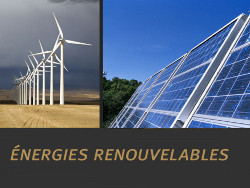
The enormous investments needed for exploration and exploitation of shale-hydrocarbons, carbon-based and greenhouse gas emitting energy-sources, should be spent on research for sustainable energy solutions, in accordance with the common interest of the population. The same goes for the enormous subventions and tax-cuts awarded to the oil-industry.
In France and elsewhere in Europe grass-root movements are demanding their governments to work on reducing greenhouse gas emissions, and to engage our nations in real de-carbonization of our economies, and to start a real energy-transition. This new orientation, based on efficiency and frugality in energy use, can do no other than ban research for, as well as production of, non-conventional hydrocarbons. Exploring and exploiting of this non-conventional fossil energy just witnesses that "the hunt after the last drop" is pushed too far.
Europe differs from the USA on various points (less wide territories, higher density of population, other laws regarding property of the subsoil, of resources…), but the way the industry lobbies is identical : the same communication strategy, the same "information war" are launched (all-expense paid trips to model-sites offered by the industry etc), and quite often this lobbying is fruitful with the European press and politicians.

TRANSATLANTIC TREATIES (TAFTA - CETA - TISA)
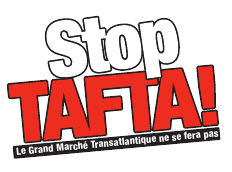
![]() TAFTA : Trans Atlantic Free Trade Agreement or Transatlantic Trade and Investment Partnership, treaty between the European Union and the US,
TAFTA : Trans Atlantic Free Trade Agreement or Transatlantic Trade and Investment Partnership, treaty between the European Union and the US,
![]() CETA : Comprehensive Economic and Trade Agreement, treaty between the European Union and Canada.
CETA : Comprehensive Economic and Trade Agreement, treaty between the European Union and Canada.
![]() TISA : Agreement on Trade in Services
TISA : Agreement on Trade in Services
These tradeagreements are meant to liberate exchanges between the US, Canada and the EUfor the profit of multinational corporations. TAFTA and TiSA (stilldrafts) would force countries who apply it to use US rules (equality by lowestlevels.) CETA, the Canadian/EU treaty signed by the European Council mustnow be validated by member states. These treaties remove all possibilityof maintaining its own environmental protections from Europe.
TAFTA/TTIP (different names for one and the same treaty) would -among other things- force to apply the American regulations, far less binding for the oil industry than the European rules (equality on the lowest level), in all countries that signed this agreement.
CETA is a similar free-trade agreement between Canada between the European Union and Canada.
Finally, these treaties would take away from the European countries all possibilities of legal action and environment protection, and could even force to apply these new standards all the way down to county-level, and for instance interfere with subjects like town-planning.
Learn more about the free-trade agreements
 Stop Gaz de Schiste - France - Ardèche
Stop Gaz de Schiste - France - Ardèche